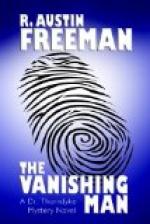“No: I haven’t really commenced to plan my experiments yet, and they will probably lead to nothing when I do. It occurred to me that, possibly, in the course of time, certain molecular changes might take place in substances such as wood, bone, pottery, stucco, and other common materials, and that these changes might alter their power of conducting or transmitting molecular vibrations. Now, if this should turn out to be the case, it would be a fact of considerable importance, medico-legal and otherwise; for it would be possible to determine approximately the age of any object of known composition by testing its reactions to electricity, heat, light and other molecular vibrations. I thought of seeking Doctor Norbury’s assistance because he can furnish me with materials for experiment of such great age that the reactions, if any, should be extremely easy to demonstrate. But to return to our case. I learned from him that John Bellingham had certain friends in Paris—collectors and museum officials—whom he was in the habit of visiting for the purpose of study and exchange of specimens. I have made inquiries of all of these, and none of them had seen him during his last visit. In fact, I have not yet discovered anyone who had seen Bellingham in Paris on this occasion. So his visit there remains a mystery for the present.”
“It doesn’t seem to be of much importance, since he undoubtedly came back,” I remarked; but to this Thorndyke demurred.
“It is impossible to estimate the importance of the unknown,” said he.
“Well, how does the matter stand,” asked Jervis, “on the evidence that we have? John Bellingham disappeared on a certain date. Is there anything to show what was the manner of his disappearance?”
“The facts in our possession,” said Thorndyke, “which are mainly those set forth in the newspaper report, suggest several alternative possibilities; and in view of the coming inquiry—for they will, no doubt, have to be gone into in Court, to some extent—it may be worth while to consider them. There are five conceivable hypotheses”—here Thorndyke checked them on his fingers as he proceeded—“First, he may still be alive. Second, he may have died and been buried without identification. Third, he may have been murdered by some unknown person. Fourth, he may have been murdered by Hurst and his body concealed. Fifth, he may have been murdered by his brother. Let us examine these possibilities seriatim.
“First, he may still be alive. If he is, he must either have disappeared voluntarily, have lost his memory suddenly and not been identified, or have been imprisoned—on a false charge or otherwise. Let us take the first case—that of voluntary disappearance. Obviously, its improbability is extreme.”
“Jellicoe doesn’t think so,” said I. “He thinks it quite on the cards that John Bellingham is alive. He says that it is not a very unusual thing for a man to disappear for a time.”




